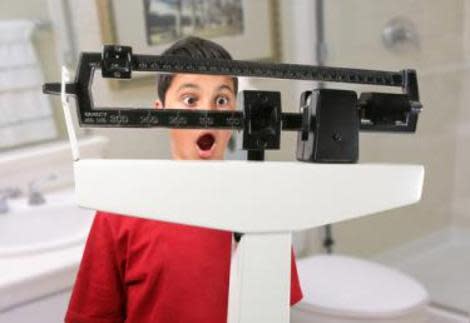Surprising Habits that Contribute to Childhood Obesity
By Erin Palinski RD, CDE, LDN, CPT for GalTime.com

Since 1980, the prevalence of obesity among children and teens has tripled. Although programs are being implemented across the country to help combat this epidemic, it seems that our children's waistlines are continuing to expand.
But is this obesity crisis caused solely by the foods our children are eating, or is there more to it? We asked some of our nation's top pediatric obesity experts what other factors may be putting your child at risk.
Lack of sleep
Lack of sleep can drastically increase obesity risk according to Vandana Sheth, RD, CDE, registered dietitian and spokesperson for the Academy of Nutrition and Dietetics, "even when adjusted for other factors, the relationship between reduced sleep and increased BMI remains strong."
In fact, one report found obesity risk to be four times greater in children who skimped on sleep! And just trying to cram in more sleep on weekends isn't the answer. Dr. Jenn Berman, creator of the No More Diets App (bit.ly/zPta00) states "research also showed attempts at making up for lost sleep did not decrease obesity risk."
So why is the link between sleep and obesity so strong? Dr. Caroline Cederquist, MD,director of Cederquist Medical Wellness Center and founder of BistroMD states "short sleep duration is associated with reduced levels of leptin, a hormone that helps regulate appetite and metabolism." When leptin decreases, this may stimulate appetite and promote overeating. To help decrease obesity risk, have your child aim for 9 and 10 hours of sleep per night.
Related: Study: Sleepy Kids Nothing New
Speed Eaters
Can how quickly your child eats affect their weight? Dr. Cederquist states "studies have shown children who are overweight eat twice as fast as thinner children." This may be due to rapid eating preventing the body's ability to recognize when it has eaten enough.
"Children need to pay attention to their body's cues, which isn't possible when eating quickly" states Dr. Berman. Encourage your child to take small bites, chew thoroughly, and aim to make each meal last at least 20 minutes.
Sedentary Hobbies
It's not just watching TV that can increase weight. Your child's interests and hobbies can also impact his body weight as well. As renowned chef and author of the Fat to Skinny book series Doug Varrieur points out, "any hobby which created a sedentary lifestyle, such as model making, drawing, and even reading, will reduce physical activity overall, promoting weight gain."
Instead, Sheth recommends, "add in more physical activities such as playing outdoors" to offset less physically active hobbies.
Related: Is Your Job Making Your Kids FAT?
Buying School Lunch
Buying school lunch seems innocent enough, but could it be contributing to the obesity epidemic? Sheth points out "a recent study found 38.8% of students who bought lunch to be overweight or obese in comparison of only 24.4% of those who bring lunch."
Could this be due to school lunches being less filling? "School lunches are high in carbohydrates and very low in protein in comparison" states Varrieur. But is brown bagging the best solution? As Dr. Cederquist mentions, a bag lunch really depends on how the family eats at home.
Aim to pack a lunch filled with vegetables, fruit, whole grains and lean proteins as your best option.
Where Children Eat May Affect Their Waistline
Sheth explains "family habits that place children more at risk for obesity include minimal meal planning, limited family meals, and eating in front of the TV.
In fact, Dr. Berman states "research found children who were overweight ate 50% of their dinners in front of the TV, whereas healthy weight children ate only 35% of their meals there." Increase family time by making it a priority to sit down and share a family dinner.
It's not only great for relationships, but it may be great for your health as well!
More from GalTime:
